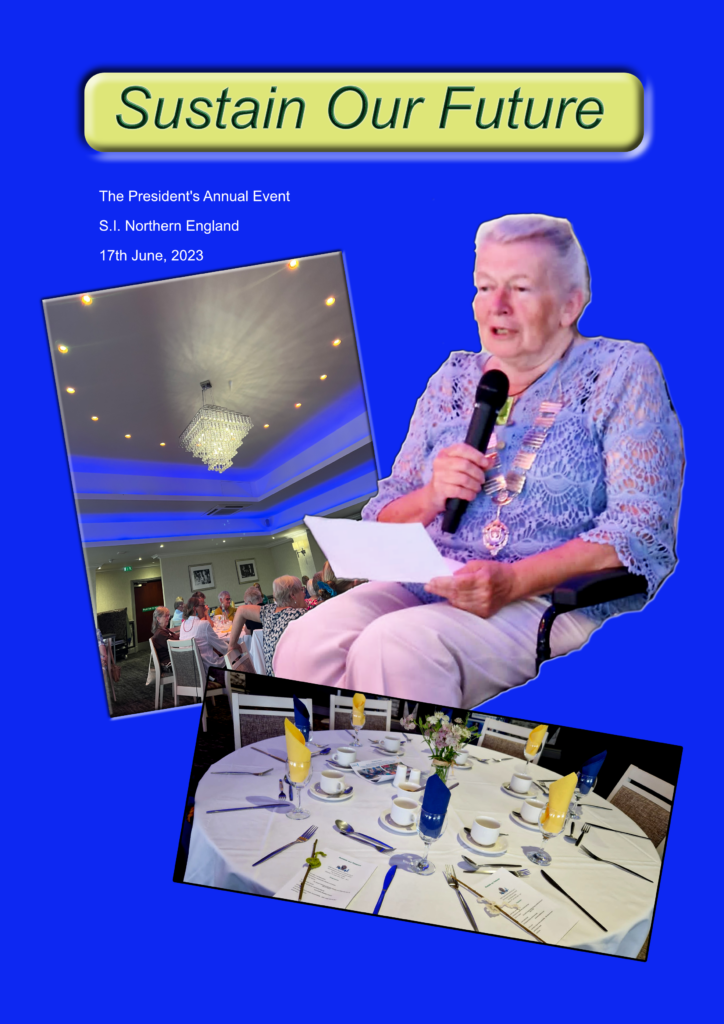SUSTAIN OUR FUTURES – President Martha’s SINE Regional Conference
June 27th2023, The Auctioneer, Carlisle
Some sixty members from across the Northern Region gathered for a day of information gathering, fellowship and a call to action around the theme of “Sustain Our Futures”.
The Health Hazards of Climate Change and What We Can Do about Them
Our opening speaker, Joe Human, truly challenged us with experiences of climate change in different parts of the world based on many years of work for Oxfam and as a Fairtrade campaigner.
He highlighted not just extreme weather events but the long-term effects on people’s health and well-being. His presentation stimulated a great deal of comment, discussion and heartfelt feeling across the room (especially as the Region was experiencing a heatwave – though nowhere near the extremes of countries such as India).
We must appreciate that heatwaves can kill!
Is our planet’s extinction therefore inevitable? Where is the hope? That, says Joe, lies in our ACTIONS!
Some recommended reading:
HOTHOUSE EARTH – AN INHABITANT’S GUIDE by Bill McGuire
NOMAD CENTURY by Gaia Vince
Sustainable Mobility Futures
We live in arguably one of the most beautiful regions in England and yet mobility across and within it remains a significant issue.
Monika Buscher, Professor of Sociology at Lancaster University and Emma Moody, Lead Strategy Adviser for Recreation and Sustainable Transport for the Lake District National Park Authority presented findings from a recent workshop in booklet form entitled: Cumbria 2037: Decarbonising Mobility Futures Journal in a Day. https://decarbon8.org.uk/cumbria-2037/
Although 20% of households in Cumbria have no car, we do seem to be locked into a car system. Even if we swapped to all electric cars we might still tip over our 1.5 degree climate target. Train and bus services are piecemeal and timed links between them are often totally impractical. So how might we move forward? Do we need more INNOVATION or perhaps greater INTEGRATION?
Clearly there are NO EASY SOLUTIONS but in order to reduce carbon emissions from transport without losing the many benefits that mobility brings we all need to seek out current opportunities and initiatives as well as lobby government to engage further with community leaders to establish further sustainable mobility futures in our region.
What Can We Do?
Following a delicious buffet lunch provided by our hosts The Auctioneer, Lindsay Edmiston and Claire Rawlinson of SI Cockermouth & District highlighted The Great Big Green Week and gave some suggestions as to what each of us might do across the region in terms of sustainability. https://greatbiggreenweek.com/
GBGW aims to challenge our politicians as to what we can do at government level. Has it been sufficiently advertised? Let’s all ensure that it’s in our club programmes for next year! (see GBGW website for dates, details,etc.)
A visual of climate stripes representing temperature gains over recent decades clearly brought home the climate crisis in which we find ourselves!

Using the WWF Footprint Calculator it was shown that on average each person has a carbon footprint of 9.5 tonnes :
29% Home 29% Travel 18% Food and 24% Stuff !
Stemming from SINE sustainability in home work the 5 most impactful activities appear to be (where possible we have sought to find some quantification evidence of the benefit):
- Turn thermostat down (https://cambridgeenergy.org.uk/wp-content/uploads/2013/11/CAR-Behaviours-Final-Report-Revision-3-060812.pdf – DECC report (2012) shows reduction of 1 deg equates to a reduction of 1,530 KWh/year/household @ 0.193 KgCO2e/KWh this is a reduction of ~0.3 t CO2e)
- Improve insulation
- Reduce Reuse Recycle
- Dry clothes outside (https://ethicalunicorn.com/2021/02/26/are-tumble-dryers-eco-friendly-how-they-damage-clothes-harm-the-environment/#:~:text=Save%20energy,around%201.8kg%20of%20CO2. This report identifies an average of 1.8Kg CO2e per drying cycle)
- Reduce water temperature
To reduce 18% Food carbon footprint, suggestions included:
- A more plant based diet
- Reduce food waste
- Buy local, buy assured organic/ free range
- Eat what is in season
- Bring back Domestic Science in schools
To compare our discussion with information provided by the Energy Saving Trust -https://energysavingtrust.org.uk/top-tips-to-reduce-your-carbon-emissions/
As their presentation ended, Claire and Lindsay urged us to make a personal pledge to Green Week, to perhaps try out the Carbon Footprint Calculator and measure our reductions over time. We were asked to plant our willow sticks and see what happens.
Finally, we were encouraged to be greener and display our hearts (made with ringpulls and crocheted in homespun wool by our speakers) for all to see.
Let’s all remember…… even a SMALL change NOW can have a BIG impact in the Future


